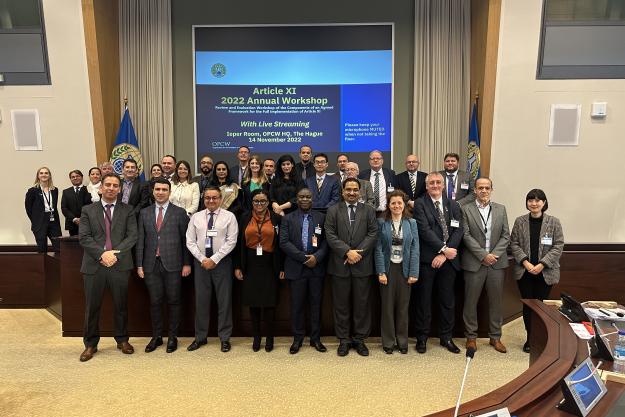
THE HAGUE, Netherlands—19 December 2022—The Member States of the Organisation for the Prohibition of Chemical Weapons (OPCW) participated in an annual Review and Evaluation Workshop of the Components of an Agreed Framework for the Full Implementation of Article XI of the Chemical Weapons Convention (CWC) on 14 November 2022 at OPCW Headquarters in The Hague, the Netherlands. The meeting was held in a hybrid format, allowing for both onsite and online participation.
The meeting was inaugurated by H.E. Ms Odette Melono, Deputy Director-General of the OPCW and H.E. Mr Ziad M.D. Al Atiyah, Permanent Representative of Saudi Arabia to the OPCW and Chairperson of the Executive Council.
The Deputy Director-General underscored that: “international cooperation has and will remain as a critical area of work for the Organisation.” She noted the efforts of the Technical Secretariat in “helping the Member States to enhance their economic and technological development through our international capacity building and assistance programmes” with “the dual aims of promoting the peaceful uses of chemistry, as well as preventing the re-emergence of chemical weapons.”
H.E. Mr Ziad M.D. Al Atiyah, in his remarks, underscored the importance of Article XI as an “indispensable pillar” of the CWC and welcomed the timing of the workshop: during the 25th Anniversary year of the CWC’s entry-into-force and before the Fifth Review Conference. He stated that “such events symbolise the importance of the Organisation’s role in contributing to the maintenance of international peace and security.” International experts contributed towards the deliberations and facilitated group discussions among delegates to focus on the three strategic thematic areas of the OPCW’s work conducted under Article XI: integrated chemicals management, enhancing laboratory capabilities, and promoting chemical knowledge.
Participants also engaged in thematic breakout groups to share ideas, lessons learned and best practices. They explored measures aimed to further promote and strengthen international cooperation initiatives toward full and effective implementation of Article XI. The participants specifically noted the importance of the future OPCW Centre for Chemistry and Technology for this purpose.
Participating in the workshop were 44 representatives from 25 OPCW Member States (including officials from National Authorities and Permanent Representations): Algeria, Argentina, Bolivia (Plurinational State of), Brazil, China, Croatia, Cuba, El Salvador, Finland, France, Germany, Guatemala, India, Japan, Malta, Mexico, Morocco, Nigeria, Qatar, South Africa, Sri Lanka, Tajikistan, United Kingdom of Great Britain and Northern Ireland, United States of America, and Uruguay.
Background
The Review and Evaluation Workshop of the Components of an Agreed Framework for the Full Implementation of Article XI has been designed to support the implementation of the Decision: Components of an Agreed Framework for the Full Implementation of Article XI of the Chemical Weapons Convention (C 16/DEC.10, dated 1 December 2011). The decision provides for the measures including capacity building, networking, and exchange, and facilitating international exchange and cooperation.
Based on the outcomes of the first workshop, four regional Article XI workshops were convened in Asia, Latin American and Caribbean (GRULAC), Eastern Europe and Africa in 2012 and 2013 to review the needs of Article XI implementation in different regions. A further workshop was organised in 2014 to explore ideas that could help develop concrete measures to fully implement Article XI.
The first global Review and Evaluation Workshop for Article XI was organised in 2016 and has since occurred annually.
As the implementing body for the Chemical Weapons Convention, the OPCW, with its 193 Member States, oversees the global endeavour to permanently eliminate chemical weapons. Since the Convention’s entry into force in 1997, it is the most successful disarmament treaty eliminating an entire class of weapons of mass destruction.
Over 99% of all declared chemical weapon stockpiles have been destroyed under OPCW verification. For its extensive efforts in eliminating chemical weapons, the OPCW received the 2013 Nobel Peace Prize.
More Information
- Article XI of the CWC (Economic and Technological Development)
- Decision: Components of an Agreed Framework for the Full Implementation of Article XI
- OPCW Centre for Chemistry and Technology
